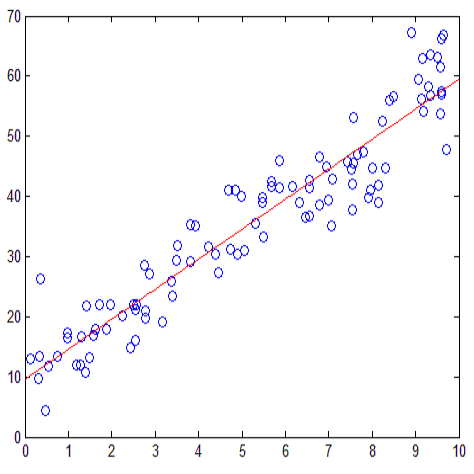We consider the multivariate max-linear regression problem where the model parameters $\boldsymbol{\beta}_{1},\dotsc,\boldsymbol{\beta}_{k}\in\mathbb{R}^{p}$ need to be estimated from $n$ independent samples of the (noisy) observations $y = \max_{1\leq j \leq k} \boldsymbol{\beta}_{j}^{\mathsf{T}} \boldsymbol{x} + \mathrm{noise}$. The max-linear model vastly generalizes the conventional linear model, and it can approximate any convex function to an arbitrary accuracy when the number of linear models $k$ is large enough. However, the inherent nonlinearity of the max-linear model renders the estimation of the regression parameters computationally challenging. Particularly, no estimator based on convex programming is known in the literature. We formulate and analyze a scalable convex program as the estimator for the max-linear regression problem. Under the standard Gaussian observation setting, we present a non-asymptotic performance guarantee showing that the convex program recovers the parameters with high probability. When the $k$ linear components are equally likely to achieve the maximum, our result shows that a sufficient number of observations scales as $k^{2}p$ up to a logarithmic factor. This significantly improves on the analogous prior result based on alternating minimization (Ghosh et al., 2019). Finally, through a set of Monte Carlo simulations, we illustrate that our theoretical result is consistent with empirical behavior, and the convex estimator for max-linear regression is as competitive as the alternating minimization algorithm in practice.
翻译:我们认为,当模型参数 $\ boldsymbol_beta1},\\ dotsc,\ boldsymbol_beta{k}}\ boldsymbol_beta}1},\ dotsc,\ boldsymbol_betymbol_beta}}\ dotsc,\ boldsymsball\ boldsymol{x}+\ mathrsylm{noise}$。 最大线性模型非常概括常规线性模型, 当线性模型的数量足够大时, 它可以将任何 convex 函数任意精确。 然而, 最大线性模型的内在非线性直线性能使得对回归参数的估算具有计算上的挑战性。 特别是, 以矩性数值为公式, 我们用直径直的直线性观测算法的直径直径直径直的直径直径直对等轨道程序进行计算和分析。




